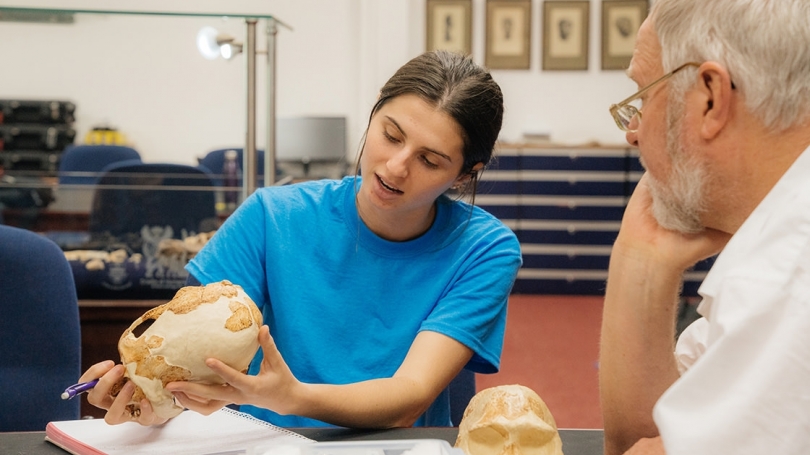Students applying to the honors program must meet the minimum College requirements of a 3.0 grade point average and a 3.3 grade point average in the major. By the end of the third term preceding their graduation, applicants will ordinarily have completed, with a minimum grade of A-, a preparatory reading course (ANTH 85) and will have submitted an Honors thesis proposal for work to be supervised by a primary faculty advisor. Admission to the program is by vote of the Department faculty, which may appoint one or more secondary advisors.
The honors project, which culminates in a substantial independent thesis, will be submitted to the primary advisor at least four weeks prior to graduation. Those students completing the program with a grade of A- or higher in their honors course will receive honors recognition in the major. High honors may be awarded by faculty vote for truly exceptional work.
The 2017-18 submissions had varied and interesting topics.
- Sumita Strander’s thesis, : “Lost in Translation: The ‘Good Enough’ and Sevā in Dementia Care for Indian Elders”, examines notions and practices of care for Indian elders with dementia. Informed by fieldwork conducted in dementia care organizations in Kolkata, India and in an “Indian Cultural Unit” of a nursing home in New Jersey. Her thesis focuses in the argument that within each geographical setting of care exists a distinctly-manifested emphasis on “taking care of” (life preservation) and neglect of “caring for” (life enhancement) the elder with dementia.
- Kennedy Jensen examines the culture of elite distance running and its relationship to disordered eating by illuminating the lived experiences of elite female distance runners at both the collegiate and professional level. In her thesis “Running a Blurry Line: Lived Experiences of Disordered Eating among Female Distance Runners”, Kennedy builds on, and elaborates, previous exploratory research among female distance runners in the context of Research Methods in Cultural Anthropology (ANTH018) to build an understanding of how disordered eating may be permitted, encouraged and perpetuated within the sport.
- Crystal A Clements explores the lived experiences of African-American mothers with postpartum depression in Washington D.C. and the ways in which trauma, violence, and stigma not only come to influence their postpartum depression narratives but are also reflective of historical legacies of trauma. In her thesis “Portraits of Postpartum Depression: Interpretations, Surveillance and the Lived-Experiences of Postpartum Depression for African-American Mothers in Washington D.C.”, Crystal uses a case study design as her methodology for this research.
- Julia Cohen’s “Negotiating Intimacies: A Study of Gendered Labor and Cross-Cultural Care in New York City” seeks to understand lived experiences of Filipina immigrant women employed as caretakers in New York City through the anthropological frameworks of the feminized global workforce, emotional labor, and cultural manifestations of care. Based on her research in New York, Julia argues that the Filipina caretakers with whom she worked rely on their own cultural values when forging emotional connections with the children they care for, thus considering them a larger extension of their own families, while remaining hyperaware of tensions that may arise if they overstep their boundaries into an overly maternal role.
- Kalei Akau explores the construction of identity as it relates to strategies of indigenous sovereignty among Native Hawaiians. Her thesis “E ‘Onipa’a Kākou: Hawaiian Identities and Political Pathways to Sovereignty” addresses why a spectrum of competing strategies to achieve political sovereignty arose and created divisions among Hawaiian communities as well as how these movements influenced the construction of Hawaiian identity itself
Click here for more information about these theses and the Honors Program in the Anthropology Department website.
Undergraduate honors theses are held at Rauner Special Collections Library. Every thesis is catalogued by the name of the student author and by the title and year. You must know the author or title in order to request the thesis. You can use the Library Catalog to browse a list of available honors theses. To narrow the listing to theses by academic department, do a keyword search in the Library Catalog for: senior thesis [add department name], e.g., senior thesis religion.
(Source: https://libanswers.dartmouth.edu/faq/29112)
